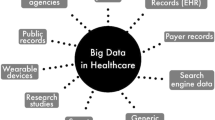
Overview
- Includes theoretical foundations, practical applications, and case studies
- Addresses the usefulness of knowledge discovery through data mining and knowledge embedding through innovative models
- Includes contributions from various fields to encourage new directions and to find explanations of why data mining and embedding knowledge can be beneficial to organizations
Part of the book series: Intelligent Systems Reference Library (ISRL, volume 159)
Access this book
Tax calculation will be finalised at checkout
Other ways to access
About this book
This book addresses the usefulness of knowledge discovery through data mining. With this aim, contributors from different fields propose concrete problems and applications showing how data mining and discovering embedded knowledge from raw data can be beneficial to social organizations, domestic spheres, and ICT markets.
Data mining or knowledge discovery in databases (KDD) has received increasing interest due to its focus on transforming large amounts of data into novel, valid, useful, and structured knowledge by detecting concealed patterns and relationships.
The concept of knowledge is broad and speculative and has promoted epistemological debates in western philosophies. The intensified interest in knowledge management and data mining stems from the difficulty in identifying computational models able to approximate human behaviors and abilities in resolving organizational, social, and physical problems. Current ICT interfaces are not yet adequately advanced to support and simulate the abilities of physicians, teachers, assistants or housekeepers in domestic spheres. And unlike in industrial contexts where abilities are routinely applied, the domestic world is continuously changing and unpredictable. There are challenging questions in this field: Can knowledge locked in conventions, rules of conduct, common sense, ethics, emotions, laws, cultures, and experiences be mined from data? Is it acceptable for automatic systems displaying emotional behaviors to govern complex interactions based solely on the mining of large volumes of data?
Discussing multidisciplinary themes, the book proposes computational models able to approximate, to a certain degree, human behaviors and abilities in resolving organizational, social, and physical problems.
The innovations presented are of primary importance for:
a. The academic research community
b. The ICT market
c. Ph.D. students and early stage researchers
d. Schools, hospitals, rehabilitation and assisted-living centers
e. Representatives from multimedia industries and standardization bodies
Similar content being viewed by others
Keywords
Table of contents (13 chapters)
-
Front Matter
-
Back Matter
Reviews
“Presenting the problems as well as solutions in a lucid manner makes this book unique. … As for the presentation, the book is the most readable and its narration is lively. Overall, this is a good book that could benefit big data mining researchers, practitioners, and anyone who wants to learn something about big data mining and embedded knowledge. Above all the book fulfils its purpose of making innovations in embedded knowledge applicable in a very efficient manner.” (Jhimli Adhikari, Intelligent Decision Technologies, Vol. 15, 2021)
Editors and Affiliations
Bibliographic Information
Book Title: Innovations in Big Data Mining and Embedded Knowledge
Editors: Anna Esposito, Antonietta M. Esposito, Lakhmi C. Jain
Series Title: Intelligent Systems Reference Library
DOI: https://doi.org/10.1007/978-3-030-15939-9
Publisher: Springer Cham
eBook Packages: Intelligent Technologies and Robotics, Intelligent Technologies and Robotics (R0)
Copyright Information: Springer Nature Switzerland AG 2019
Hardcover ISBN: 978-3-030-15938-2Published: 16 July 2019
Softcover ISBN: 978-3-030-15941-2Published: 14 August 2020
eBook ISBN: 978-3-030-15939-9Published: 03 July 2019
Series ISSN: 1868-4394
Series E-ISSN: 1868-4408
Edition Number: 1
Number of Pages: XIX, 276
Number of Illustrations: 22 b/w illustrations, 40 illustrations in colour
Topics: Computational Intelligence, Data Mining and Knowledge Discovery, Big Data, Big Data/Analytics, Artificial Intelligence



